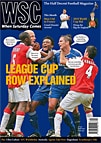 A season ruined by a controversial points deduction. David Wangerin writes
A season ruined by a controversial points deduction. David Wangerin writes
A club unable to balance their books is nothing new to football; start with Chelsea and work your way down. In the case of Scarborough, though, there has been no Russian tycoon to underwrite their bid for glory and overspending problems have left the club languishing in administration for the past several years. This was converted into a Company Voluntary Arrangement (CVA) last May, just before the Conference’s AGM.